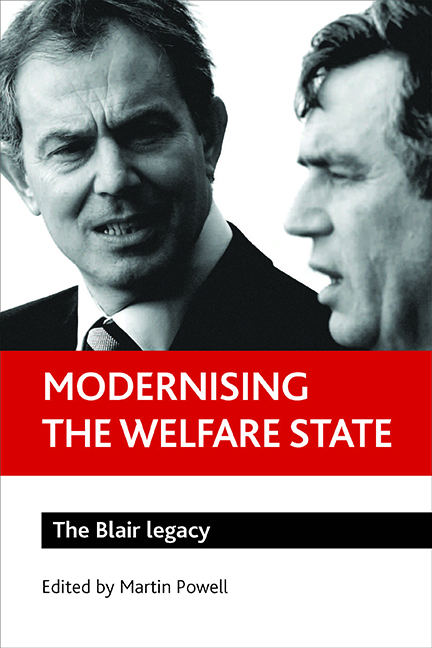Book contents
- Frontmatter
- Contents
- List of tables and figures
- Acknowledgements
- Notes on contributors
- one Introduction: modernising the welfare state
- two The NHS after 10 years of New Labour
- three Housing policy: coming in out of the cold?
- four Social security and welfare reform
- five Social care under Blair: are social care services more modern?
- six Education: from the comprehensive to the individual
- seven Controlling crime and disorder: the Labour legacy
- eight Social investment: the discourse and the dimensions of change
- nine Risk and the Blair legacy
- ten Going private?
- eleven Choice in public services: ‘no choice but to choose!’
- twelve The conditional welfare state
- thirteen The stages of New Labour
- fourteen Social Democratic reforms of the welfare state: Germany and the UK compared
- fifteen Conclusion: the Blair legacy
- Index
- Also available from The Policy Press
thirteen - The stages of New Labour
Published online by Cambridge University Press: 21 January 2022
- Frontmatter
- Contents
- List of tables and figures
- Acknowledgements
- Notes on contributors
- one Introduction: modernising the welfare state
- two The NHS after 10 years of New Labour
- three Housing policy: coming in out of the cold?
- four Social security and welfare reform
- five Social care under Blair: are social care services more modern?
- six Education: from the comprehensive to the individual
- seven Controlling crime and disorder: the Labour legacy
- eight Social investment: the discourse and the dimensions of change
- nine Risk and the Blair legacy
- ten Going private?
- eleven Choice in public services: ‘no choice but to choose!’
- twelve The conditional welfare state
- thirteen The stages of New Labour
- fourteen Social Democratic reforms of the welfare state: Germany and the UK compared
- fifteen Conclusion: the Blair legacy
- Index
- Also available from The Policy Press
Summary
Introduction
When Labour came to power in 1997 it appeared to represent a mix of the modern, with its promise to reinvigorate the constitution, and the traditional, declaring itself to be guardian of the welfare state and promising to ‘save the NHS’. How much has Labour's approach to policy changed in the past 10 years? Has policy under Blair and now Brown formed the basis of a new social policy settlement, or has change been less radical than the government has often claimed?
This chapter uses frameworks from 6 and Peck (2004a, 2004b) and Hall (1990, 1993) to examine the extent of change that has taken place since 1997. The key policy question Hall's framework asks of Labour is whether or not its approach to public reform represents an approach with a new hierarchy of goals in place, a new policy ‘paradigm’, or is it instead a variant of the Conservative approach that preceded it? Can Labour policy be divided into a series of stages or moments (Greener, 2004b) that show changes in Labour's approach?
6 and Peck organise their analysis around a series of headings derived from Labour policy documents: inspection, central standard setting, area-based initiatives, coordination and integration, devolution but limited decentralisation, earned autonomy, an extended role for private capital, a modest increase in citizen obligations, improved public access and e-government. Each of these has a role to play in exploring the extent of change. Hall's work on policy ‘paradigms’ suggests that the dominant ideas of government follow the path of a punctuated equilibrium in which periods of relative stability are followed by violent change, after which, once again, equilibrium is restored. This follows the path of scientific discovery suggested by Kuhn (1970), but also has clear links with more contemporary work examining how ideas and institutions constrain actor behaviour within them (Mahoney, 2000; Greener, 2006a). Policy change can be: first order, where the settings of policy instruments are changed, but within the same overarching policy framework; second order, where policy instruments are changed, but the same underlying policy framework still exists; or third order, where the goals of policy are significantly changed, and where a policy paradigm shift occurs (Oliver, 1996, 1997; Greener, 2001).
- Type
- Chapter
- Information
- Modernising the Welfare StateThe Blair Legacy, pp. 219 - 234Publisher: Bristol University PressPrint publication year: 2008



